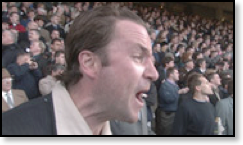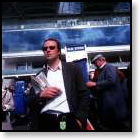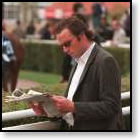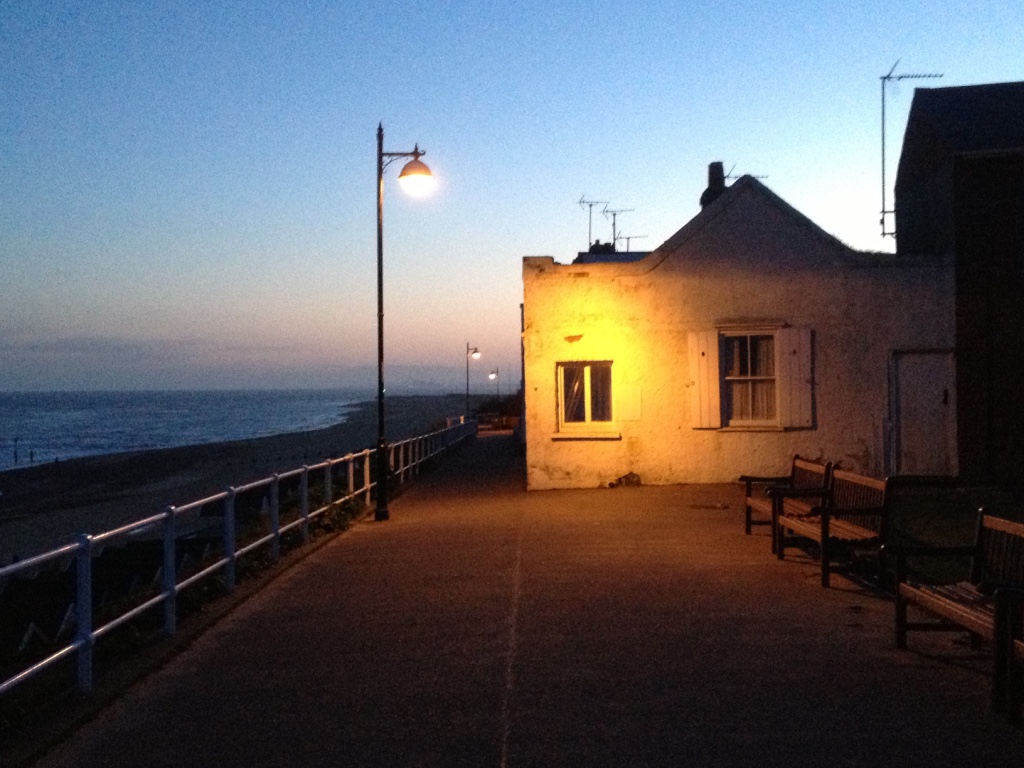THE GAMBLER (2000)

Producer/Director
3 x 50 mins, Digibeta & DV
TX Dec 2000
Diverse Productions for C4
Three-part series following gonzo writer Jonathan Rendall as he travels from Great Yarmouth to Las Vegas, en route losing £12,000 he was given by Channel 4. His job is to bet on anything: from racing to roulette, boxing to blackjack. If he wins, he gets to keep the winnings. When he loses, we get to share his pain. All he needs is a lucky suit, some decent inside information and the chance to clear his head. If he plays his cards right, it's a trip that could set him up for life. But he's got more than the odds against him. Cult viewing.
The programme is pure joy.
Mail on Sunday
It's shot in a choppy, jazzy style... self-destructiveness is fascinating... we're on to a winner.
The Independent
...insightful, charming and articulate. The Gambler is the pleasant surprise of the week.
The Times
Watching him experiencing the agony and ecstasy of his solitary pleasure was about as edifying as watching him masturbate.
The Evening Standard
The surreal atmosphere is a result of a divergence of goals - Rendall desperately wants to win; the director wants him to lose.
Time Out
Rendall is an odd cove: he dresses like a permanent postgrad, looks like Marcus out of Eldorado, and has a dazzling repertoire of facial and verbal tics. He has also won the Somerset Maugham Prize - but, as one of his bookies helpfully pointed out "That was for writing, not for gambling." Last night he flexed his gambling muscles with a flutter on the gee-gees and a session in the Golden Nugget, Great Yarmouth, where, to nobody's surprise, he failed to win the penny fountain. He had all the chat, and spoke knowledgeably of "yankees" and "sweating between the legs" - a bad sign in a horse, we were told, and probably in a punter as well. He sat in an old blokes' pub rubbing away at £100's worth of lottery scratch cards, and emerged with just £38 in winnings. The highlight to a rollercoaster evening came at the end, when Rendall attended Cheltenham during Gold Cup week, and placed £1,000 on one horse, possibly called Flagship Uber Alles. "It's just something I've got to do", he muttered, a man possessed. We saw nothing of the race; the camera remained mercilessly on Rendall's face as he went through the full gamut of gambler's emotions. Childlike excitement at having placed the bet, studied indifference as the race began, mounting hysteria as victory seemed to be within reach - and then horrible, stomach-turning disappointment when the horse fell at the penultimate fence. Flagship limped across the finishing line, but it was all over for Rendall. "It's totally done me in," he said, suddenly looking very much older.
The Guardian
In last night's The Gambler (C4), Don Laughlin was showing Jonathan Rendall around his improbably lavish pad, which included another pad for his personal helicopter. He financed his lifestyle by owning the Riverside Casino, in a town called - not by coincidence, one suspects - Laughlin, Nevada. "I tell them, `Lots of luck,' " he cackled. "I don't tell them which kind, there's two kinds." Actually, there's only one kind: the casino's. As one sensible person pointed out to Rendall, if you weren't bound to lose, the casinos wouldn't make all that money. Over the last two weeks, Rendall has spent several thousand pounds of Channel 4's money demonstrating the truth of this. This week, though, he demonstrated another proposition: that the real drawback with gambling is not simply that you lose, but that you think you're winning. In this final episode, Rendall did have three big wins - at roulette, at dirt- track racing, and on a boxing-match. The fact that his wins were more than matched by his losses, and his purse was getting emptier, didn't seem to register. A nice illustration of this "gambling think" came at the blackjack table in Atlantic City. Rendall found himself sitting next to a man who was betting with a suicidal recklessness, while the dealer enjoyed a phenomenal run of 21s and blackjacks. This made Rendall feel comparatively conservative and sensible; so he stayed at the table much longer than he could afford. The only way to be sure of winning is to cheat. Rendall visited a prison in Texas to meet Dennis McAndrew, alias Dennis Nikrasch, who - until he was caught - was the world's most successful slot-machine cheat. Using a home-made, handheld computer-operated device he built himself, he took $10m off several casinos in Las Vegas. McAndrew was blunt: "I don't gamble, I cheat. I think you have to be a flat sucker to be a gambler." Rendall felt he probably had the right idea: after all, he thought, casinos are scamming you, so why not scam them? It might be fairer to say that casinos don't scam the gambler, the gambler scams himself. All the casinos do is provide the facilities and take a hefty commission. On the other hand, your sympathies were with the card-counter who explained that he will be thrown out of any casino that caught him at it: since card-counting requires nothing more than concentration, it seems that casinos regard using your brain as a form of cheating. The programme went a little overboard emphasising the shabbiness of this world (we really didn't need to see Rendall checking the half-healed gouge on his foot); but it was as well to hammer it home, I guess.
The Independent


I am a man of many vices, but, thank God, gambling isn't one of them. I wonder if Jonathan Rendall would ever like to be in the position of being able to say the same thing. For The Gambler (C4, Wednesday), Rendall was given £12,000 to bet with, and it took him three programmes to do it. I suspect I'd have blown the lot by the first commercial break (though possibly not on gambling). I know Rendall of old, from his days on this paper's Sunday sister, when there was always the impression that he'd just risen dishevelled from the gutter - quite literally - to relay his latest dispatch from the netherworld. And the third instalment began, appropriately, with him in a New York flophouse (well, a spartan hotel room, at least) having been relieved of his belongings during the night. It would be all too easy to say that it was downhill all the way from there, but in fact there was some light in the subterranean gloom which I've always imagined Rendall to inhabit. As part of his campaign, he was at Prescott Downs, a small race track in the United States. Before he left for the course, we saw him ringing one of his London bookies, laying out yet more money on Wellbeing for the Derby. They put the phone by the telly so he could hear the commentary. The scene was set. It came fourth. Of course. "One thing at the start of this project I wanted to avoid was the losing bender - when you start losing and enjoying it," Rendall said at the beginning. "It just becomes an exhilaration, spending the money. It's almost like enjoying yourself." As he was on his way to the track, though, warning bells begin to peal out. "I'm feeling in a very, very reckless mood today," he confided to camera with a rueful smile. "It's a country track, it's an ideal venue to give your money to bookmakers." His credibility as a punter received an early battering, even as one of his fancies was delivering for him. "Come on 5, come on 5! No, I'm on 2, what am I talking about - I was following the wrong horse round! No 2's won!" The day's events are intercut with next morning's sober reflections. "That was a very dangerous day, because I was losing so much," he said. "I'd gone through $1,350 on the Derby, and another $900 on races here. Then I went on the same day on Curule in the Belmont - a race I know absolutely nothing about, on dirt, which I know absolutely nothing about, on a horse no one rated. I don't know why I convinced myself it was going to win." It didn't, of course. Came last, in fact. But Rendall wasn't in the slightest bit deterred. "I love racetracks," he said. "It's the people, it's the drinking, it's having a good time - you're not shackled to a desk somewhere. It's like a party. You don't want to leave." Between the Derby and the Belmont, he'd lost a quarter of his original loot. "And I really enjoyed it. I think that's when you've got to take stock." He took stock by doing a forecast - selecting the winner and runner-up in order - on the fifth race at Prescott Downs. This was supposed to constitute a more measured approach. "Previously I'd been chucking it away, literally tossing it away," he said, "and I felt so happy, giddy with delight and ecstasy." Most people doing a forecast put a couple of quid on it - but then again, few of us have been handed 12 grand to pass on to the bookies. "That's the stupidest bet I've ever put down in my life," Rendall said as he shelled out $100. "I told you I was feeling reckless today. I'm going completely against my principles here, but I'm so far down I need some ludicrous, slot-machine-style bet to get out of trouble. If this loses, that's it." Remarkably, bizarrely, his boat came in. "I've bloody won it!" he yelled, wild-eyed. "I love your track 101 times more now," he assured a local couple who'd been monitoring his progress, adding quickly: "I loved it to begin with when I was losing." Even one of the crew came from behind the camera to congratulate him. He picked up more than two grand. Within a couple of milliseconds, his mind was racing ahead to how he was going to divest himself of this embarrassment of modest riches. "Well, obviously I'm flying to Vegas." Uh-oh, you thought. I've always said you can't argue with a confident man. "I lost it yesterday and I still ended up with a big win," he said. "I can be that bad and still win - so if I put my mind to it, no problem." As the programme cut for the ads, before the final segment, you feared the worst. "By the time we got to Vegas" - it sounds like the start of a classic country lyric - "I already had a sense of things starting to fall apart," Rendall muttered. In fact, once again, it wasn't all disaster. He steeled himself to walk away from the blackjack table before he'd lost everything. And although you just knew he was never going to turn a profit on his £12,000, there was an upbeat ending, when his very last bet - Shane Moseley to beat Oscar De La Hoya - earned him $4,400. "I'm going home with a few thousand dollars," he said. He sounded surprised. I think we all were.
The Independent
Visit Diverse Website description
Read Jonathan's diary of the experience




